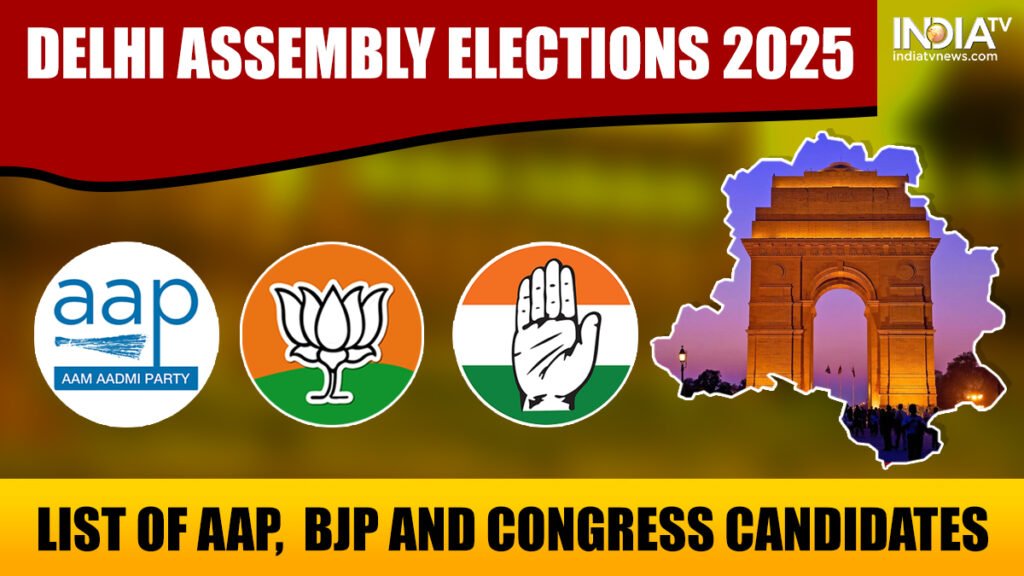
The Delhi Assembly Elections 2025 are around the corner, and the political atmosphere in the capital is charged with anticipation. As parties gear up for one of the most significant state elections in India, voters and political analysts alike are closely watching the developments. In this comprehensive guide, we will delve into the key aspects of the Delhi Assembly Elections 2025, including important dates, major political parties, key candidates, electoral issues, and the expected outcomes.
Introduction to Delhi Assembly Elections 2025
The Delhi Assembly Elections 2025 will determine the representatives for the 70 constituencies in the Delhi Legislative Assembly. Held every five years, these elections are crucial as they shape the governance and policy direction of the National Capital Territory (NCT) of Delhi. The last assembly elections were held in 2020, where the Aam Aadmi Party (AAP) secured a landslide victory, winning 62 out of 70 seats.
With the political landscape evolving rapidly, the Delhi Assembly Elections 2025 promise to be a contest to watch, featuring intense competition among the major political players.
Key Dates and Election Schedule
The Election Commission of India (ECI) will soon release the official schedule for the Delhi Assembly Elections 2025. Typically, the process includes the following phases:
Announcement of Election Dates
Filing of Nominations by Candidates
Scrutiny of Nominations
Withdrawal of Candidature
Polling Day
Counting of Votes and Result Declaration
Stay tuned to official announcements and news portals to keep updated with the exact dates and timelines.
Major Political Parties and Key Candidates
Several political parties will vie for power in the Delhi Assembly Elections 2025. The major contenders include:
Aam Aadmi Party (AAP): The incumbent party, led by Chief Minister Arvind Kejriwal, will be seeking a third consecutive term. Known for its focus on education, healthcare, and public welfare, AAP has built a strong base in Delhi.
Bharatiya Janata Party (BJP): As the ruling party at the national level, the BJP will aim to break AAP’s stronghold in Delhi. With a focus on nationalistic policies and infrastructure development, the BJP will present a formidable challenge.
Indian National Congress (INC): Once a dominant force in Delhi politics, the Congress will attempt to regain lost ground. Under new leadership, the party will focus on reconnecting with its traditional voter base.
Key Candidates to Watch:
Arvind Kejriwal (AAP) – Incumbent Chief Minister and a prominent face in Delhi politics.
Manoj Tiwari (BJP) – A strong contender with a significant influence among Delhi’s migrant population.
Ajay Maken (INC) – A seasoned politician aiming to revive Congress’s fortunes in Delhi.
Key Issues Shaping the Delhi Assembly Elections 2025
Several critical issues will dominate the discourse in the Delhi Assembly Elections 2025:
Education and Healthcare: AAP’s reforms in these sectors have been widely recognized. Voters will evaluate whether these improvements have sustained and if new promises are credible.
Pollution and Environment: Delhi’s perennial struggle with air pollution and environmental degradation will be a significant concern.
Infrastructure and Development: Roads, public transportation, and urban development projects will be key areas of focus for all parties.
Law and Order: Rising concerns about safety, especially for women, will influence voter sentiment.
Electricity and Water Supply: Consistent and affordable access to basic utilities remains a pressing issue for Delhi’s residents.
Voter Demographics and Participation
Delhi’s electorate is diverse, comprising various socio-economic groups, communities, and age brackets. Key demographic insights include:
Youth Voters: A significant portion of the electorate is young, and their concerns about employment, education, and digital infrastructure will be pivotal.
Women Voters: Women’s safety, employment opportunities, and healthcare services are critical issues.
Migrant Population: A large number of Delhi’s residents are migrants from other states, and their voting patterns could sway the election results.
The Election Commission has been actively promoting voter registration and participation to ensure a high turnout in the Delhi Assembly Elections 2025.
How to Register and Vote in Delhi Assembly Elections 2025
To participate in the Delhi Assembly Elections 2025, ensure you are registered as a voter. Here’s a quick guide:
Voter Registration: Visit the official ECI website (https://eci.gov.in) and navigate to the voter registration section. You can also use the Voter Helpline app.
Check Your Name on the Electoral Roll: Use your EPIC number or personal details to verify your registration.
Voting on Polling Day: Carry a valid ID proof (Voter ID, Aadhar Card, Passport, etc.) to your designated polling station. Follow the instructions of election officials to cast your vote.
Importance of the Delhi Assembly Elections 2025
The Delhi Assembly Elections 2025 hold significant importance not only for the capital but also for the national political landscape. The results will:
Influence National Politics: Delhi’s political trends often reflect broader national sentiments and can impact upcoming general elections.
Set Governance Benchmarks: Policies implemented in Delhi serve as models for other states, especially in urban governance and public welfare.
Empower Citizen Participation: These elections are an opportunity for Delhi’s residents to voice their opinions and shape the city’s future.
Expected Outcomes and Predictions
While it is challenging to predict the exact outcome of the Delhi Assembly Elections 2025, several factors will influence the results:
Performance of the Incumbent Government: AAP’s track record over the past five years will be under scrutiny.
Opposition Strategies: The BJP and Congress’s ability to present a united front and compelling alternatives will be critical.
Public Sentiment and Key Issues: The electorate’s response to major issues like pollution, infrastructure, and public welfare will shape voting patterns.
Political analysts suggest a closely contested election, with potential shifts in voter allegiance based on emerging issues and campaign dynamics.
Conclusion

2 thoughts on “Delhi assembly elections”